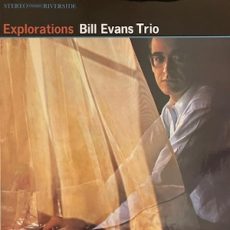
Requisites
Explorations ~ Bill Evans Trio | By Eddie Carter
My admiration for Bill Evans runs very deep, and I have cherished the pianist’s music since childhood. This morning’s selection from my library holds a special place in my heart. It was one of my mom’s favorites during our Sunday family dinners. Explorations (Riverside RLP 351/RLP 9351) by the Bill Evans Trio is a 1961 release and one of four outstanding albums featuring Scott LaFaro on bass and Paul Motian on drums. Its timeless charm makes it an essential addition for any jazz piano lover. I could stop here, but I won’t leave you with just a small taste; instead, I’ll share the entire eight-course meal with you. My copy is no. 843 of the 2024 U.S. Craft Recordings stereo audiophile reissue (Riverside CR 00825).
Israel by John Carisi opens the album, setting the tone for the trio’s introduction and medium melody. Bill solos first with a cheerfully carefree groove. Scott adds his voice to a lighthearted reading that flows like a lovely stream. Bill returns to exchange notes with Paul before a marvelous conclusion. Haunted Heart is a gorgeous tune by Howard Dietz and Arthur Schwartz that begins with Evans’s brief, poignant introduction blossoming to the ensemble’s deeply touching theme. Bill takes center stage as the soloist, delivering each verse with grace and sensitivity, matched by Scott and Paul’s subtle support into a gentle climax.
Beautiful Love, by Haven Gillespie, Wayne King, Egbert Van Alstyne, and Victor Young, presents the trio with a delightful opportunity to pay homage to the 1930s classic at a toe-tapping beat during the melody. Bill’s respect for the original composition is evident in a joyful opening solo, followed by Scott’s inspired walk in the subsequent reading, leading to the closing chorus and exit. The trio treats Earl Zindars’s Elsa with endearing care, crafting an opening chorus that sparkles like a night on the town with that special someone. Bill guides each note of the first solo elegantly. Paul follows with a soothing and refined performance, preceding a tender reprise of the theme.
Side Two opens with an enchanting rendition of Nardis, one of Miles Davis’s prettiest compositions that Bill initially recorded with Cannonball Adderley. The trio’s pretty theme sets things in motion. Scott takes the lead with an elegant opening statement. Bill then shares his intimate, sincere thoughts in the second solo, leading to a gorgeous reprise and conclusion. The trio probes one of Irving Berlin’s loveliest questions next, How Deep Is The Ocean? They swing softly in a luscious melody. Again, the song’s only soloist, Bill’s interpretation is the epitome of grace and beauty, preceding a beautiful closing chorus that showcases their musical fluency and understanding of each other’s playing.
I Wish I Knew, by Mack Gordon and Harry Warren, is a beautiful ballad from the 1940s. The ensemble introduces it at a gentle, unhurried tempo, leading to the theme. Bill offers a serene and heartfelt interpretation that concludes in a tender finale by the trio. Sweet and Lovely by Gus Arnheim, Jules LeMare, and Harry Tobias is pure fun from start to finish. After the trio’s melody, Bill begins a solo that evolves from a quiet, spoken tone to a playful and spirited one. The pianist and drummer engage in a brief dialogue before Paul delivers a concise solo that ties everything together, leading back to the theme’s reprise and a delightful conclusion.
Orrin Keepnews was at the helm of Explorations, Bill Stoddard was the recording engineer, and Jack Matthews mastered the initial session. Bernie Grundman mastered the reissue from the original tapes. The record is pressed on 180-gram vinyl, using Neotech’s VR900 vinyl compound, and manufactured using a one-step lacquer process. The sound quality of this reissue is exceptional, offering an impressive soundstage that brings the musicians to your listening room with stunning fidelity. This limited-edition box set is 2,500 copies, each individually numbered and presented in a foil-stamped, linen-wrapped slipcase featuring an acrylic inset of the original artwork. The record is protected by an archival-quality, anti-static, non-scratching inner sleeve.
Explorations marked Bill Evans’s final studio collaboration with Scott LaFaro. He was a brilliant hard-bop bassist, admired and celebrated for his playing of uptempo tunes or ballads. His contributions brought an outstanding level of sophistication, maturity, and precision to the four albums he recorded with The Bill Evans Trio. Tragically, just ten days after the trio’s 1961 performance at the Village Vanguard, LaFaro’s life was cut short due to a car accident. This devastating loss deeply affected Evans, who withdrew from live performances and recording for several months. If you’re discovering his music or are already a Bill Evans fan, I urge you to listen to Explorations by the Bill Evans Trio at your earliest opportunity. It’s an outstanding showcase of jazz that I can’t recommend enough for your library!
~ Portrait In Jazz (Riverside RLP 12-315/RLP 1162), Portrait of Cannonball (Riverside RLP 12-269), Sunday at The Village Vanguard (Riverside RLP 376/RLP 9376), Waltz For Debby (RLP 399/RLP 9399) – Source: Discogs.com
~ How Deep Is The Ocean, Sweet and Lovely – Source: JazzStandards.com
~ Beautiful Love, Israel, Nardis – Source: Wikipedia.org
© 2025 by Edward Thomas Carter
More Posts: choice,classic,collectible,collector,history,instrumental,jazz,music,piano
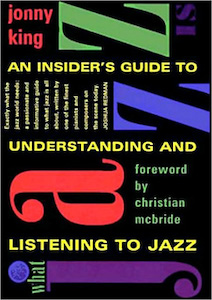
On The Bookshelf
WHAT JAZZ IS | JONNY KING
Drawing on the unique insight of a seasoned jazz pianist, What Jazz Is offers an illuminating journey into the heartbeat of America’s original art form. With clarity and passion, Jonny King breaks down the essential building blocks of jazz, tempo, harmony, and melody, demystifying the role each instrument plays in creating the genre’s unmistakable sound.
Through the eyes and ears of a performer, he reveals the hidden structure behind improvisation, showing that what often sounds spontaneous is guided by a deep internal logic and shared musical language. Far from abstract theory, his explanations come to life through vivid examples and personal reflections.
King pays tribute to the giants who shaped jazz, Art Blakey’s explosive rhythms, John Coltrane’s spiritual intensity, Thelonious Monk’s angular genius, while also spotlighting the brilliance of modern innovators like Kenny Garrett, Christian McBride, and Joshua Redman.
Part guide, part homage, What Jazz Is invites readers to hear jazz not just as music, but as a conversation—one that’s rich with history, soul, and ever-evolving creativity.
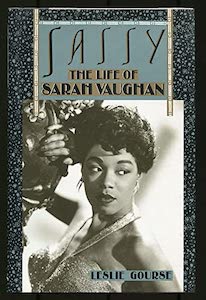
On The Bookshelf
SASSY: THE LIFE OF SARAH VAUGHAN | LESLIE GOURSE
This is a vivid, intimate portrait of one of the most extraordinary voices in American music. In this definitive biography, acclaimed jazz chronicler Leslie Gourse brings to life the woman behind the legend— a vocal genius whose range, tone, and effortless improvisation changed the sound of jazz forever.
Born in Newark, New Jersey on March 27, 1924, Sarah Vaughan began her musical journey in the pews of Mount Zion Baptist Church, where she played organ and sang in the choir. By her early twenties, she was performing alongside jazz revolutionaries like Dizzy Gillespie, Charlie Parker, and Billy Eckstine—helping shape the very fabric of bebop and setting a new standard for vocal jazz.
A look behind the glamorous performances was a woman navigating a life as complex as her music: three turbulent marriages, financial upheavals, and a nightlife fueled by passion, excess, and resilience. Yet Vaughan remained grounded, driven by an unwavering dedication to her family and her art. Her voice is rich, operatic, and fearlessly expressive, defying genre boundaries, earning her acclaim in both jazz and pop and elevating her to the rare status of jazz’s only diva.
Gourse draws upon candid interviews with those who knew her best, revealing a fiercely talented, deeply human artist, unpretentious, hard-working, and ultimately triumphant.
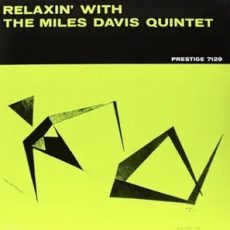
Requisites
Relaxin’ With The Miles Davis Quintet ~ The Miles Davis Quintet | By Eddie Carter
In just two days in 1956, the Miles Davis Quintet recorded four remarkable albums, which are widely regarded as quintessential examples of hard bop and have endured as jazz classics over time. They fulfilled Davis’s contract with Prestige Records before moving to Columbia Records, his home for some of the most iconic music over the next thirty years. The albums are Cookin’ (1957), Workin’ (1959), Steamin’ (1961), and today’s focus, Relaxin’ With The Miles Davis Quintet (Prestige PRLP-7129), released in 1958. Miles Davis is on muted trumpet (tracks: A1 to A3, B1, B2), and trumpet (B3), John Coltrane is on tenor sax, Red Garland is on piano, Paul Chambers is on bass, and Philly Joe Jones is on drums. My copy is no. 535 of the Craft Recordings Limited Edition mono reissue (Prestige CR 00227).
The first side opener, If I Were a Bell by Frank Loesser, became a jazz standard after Davis’s rendition on this album. Miles snaps his fingers to set the rhythm ahead of the quintet’s medium-paced melody. The muted trumpet’s ideas unfold in the opening statement. John demonstrates his signature fluidity next. Red takes an energetic solo ahead of the theme’s reprise and a subtle conclusion. After two brief false starts, You’re My Everything by Mort Dixon, Harry Warren, and Joe Young begins with the quintet’s tender introduction, ahead of Miles’s delicately heartfelt melody and opening solo highlighting his more sentimental side. John executes a graceful, intimate statement, supported by the trio’s rich foundation, leading to a thoughtfully reflective finale from Davis.
The pace picks up noticeably for I Could Write a Book by Richard Rodgers and Lorenz Hart. The trio gets things started, leading to the quintet’s collective medium-fast melody. Miles takes off first with brisk, vibrant notes that set the mood. John fills the air with pure joy next, and then Red’s reading is so full of energy before the leader takes the song out, which ends abruptly. Sonny Rollins’s Oleo opens the second side with two false starts and some lighthearted studio chatter, ahead of Davis’s introduction and the quintet’s lively theme with John completing the melody. Miles goes first, delivering a spirited statement, then John soars into an energetic turn. Red concludes with an upbeat reading while Paul and Philly propel each soloist to new heights before the group’s brisk finish.
Up next is It Could Happen To You by Jimmy Van Heusen and Johnny Burke. The ensemble adopts a relaxed midtempo vibe with Miles leading the theme. He then continues with a sweet-toned first solo. John follows with a compelling statement that’s as cool as the other side of the pillow. Red brings out the liveliness in a cheerful interpretation, engaging beautifully with Paul and Philly in the subdued climax. Woody ‘n’ You by Dizzy Gillespie begins with Red’s brief introduction preceding the opening ensemble. Miles commands the lead solo with fiery passion on the open horn, paving the way for John’s high-energy performance. Davis and Jones share the song’s final moments in the closing chorus, culminating in a gentle fade. A few final words from Miles brings the jazz standard to a close.
Bob Weinstock oversaw the original session, and Rudy Van Gelder was the recording engineer. For this audiophile reissue, Mark Piro and Mason Williams took charge of production, and Bernie Grundman mastered the album from the original tapes. The record is pressed on 180-gram vinyl, using Neotech’s VR900 vinyl compound, and manufactured using a one-step lacquer process. The sound quality of this reissue is truly exceptional, offering a beautifully balanced soundstage that’s ideal for demonstration on a good mid-fi or high-end audio system. This limited-edition box set is 5,000 copies, each individually numbered and presented in a foil-stamped, linen-wrapped slipcase featuring an acrylic inset of the original artwork. The record is protected by an archival-quality, anti-static, non-scratching inner sleeve.
One of the highlights of this reissue is the inclusion of studio snippets, such as false starts and Miles’s conversations with Rudy Van Gelder. These moments offer the listener a unique sense of connection to the studio sessions, making them part of the event. On mid-fi or high-end audio systems, the tonal balance across highs, midrange, and low frequencies truly shines in a stunning soundstage. Relaxin’ With The Miles Davis Quintet is an excellent album of standards, showcasing inspired performances by every member. It’s a superb choice for enjoying at any time of the day or evening. I highly recommend it for a spot in your library, and I urge you to pick up a copy before it sells out, because you ain’t gettin’ mine!
~ Cookin’ With The Miles Davis Quintet (Prestige PRLP 7094), Steamin’ With The Miles Davis Quintet (Prestige PRLP 7200), Workin’ With The Miles Davis Quintet (Prestige PRLP 7166) – Source: Discogs.com
~ Oleo, It Could Happen To You, Woody’n You – Source: JazzStandards.com
~ If I Were A Bell, You’re My Everything, I Could Write A Book – Source: Wikipedia.org
© 2025 by Edward Thomas Carter
More Posts: choice,classic,collectible,collector,history,instrumental,jazz,music,trumpet
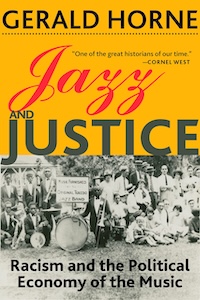
On The Bookshelf
Jazz and Justice explores the rich, complex origins of jazz, the historical American art form born in the late 19th century, most likely in the brothels of Storyville in New Orleans, Louisiana from the cultural traditions of the newly emancipated African Americans. Rooted in the blues, a genre that gave voice to the pain, endurance, and aspirations of the oppressed Black communities under Jim Crow. Jazz emerged from the discarded instruments of post–Civil War military bands and quickly evolved into a profound cultural force.
In this revelatory work, historian and professor Gerald Horne examines the social, economic, and political dynamics that shaped jazz into a singular Black American contribution to global arts and culture. He chronicles the struggles musicians faced in a deeply segregated and exploitative society, contending with organized crime, white supremacist groups like the Ku Klux Klan, and the pervasive racism of American society and the entertainment industry.
Horne gives overdue recognition to the groundbreaking contributions of women artists, such as pianist Mary Lou Williams and trombonist Melba Liston, while also highlighting the influence of musicians with Native American heritage. Jazz and Justice is both an incisive historical investigation and a tribute to the resilience of an art form that gave voice to generations.
Jazz & Justice: 2019 | Gerald Horne
Monthly Review Press



